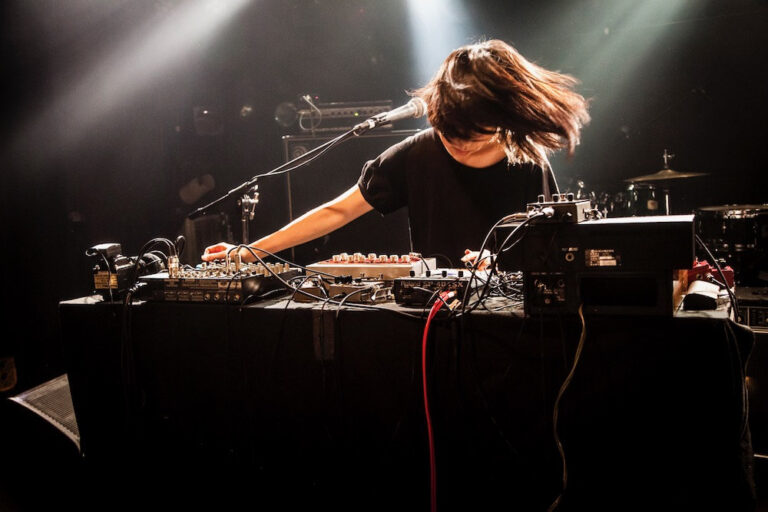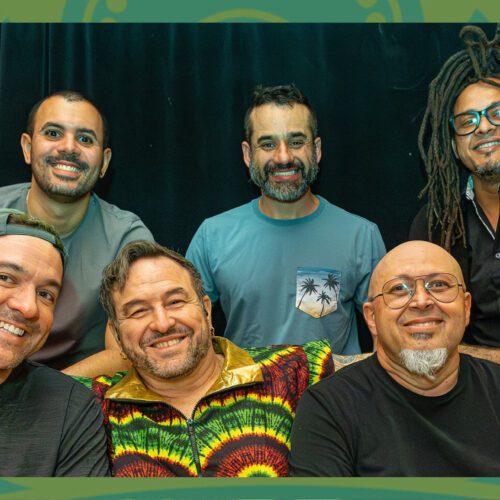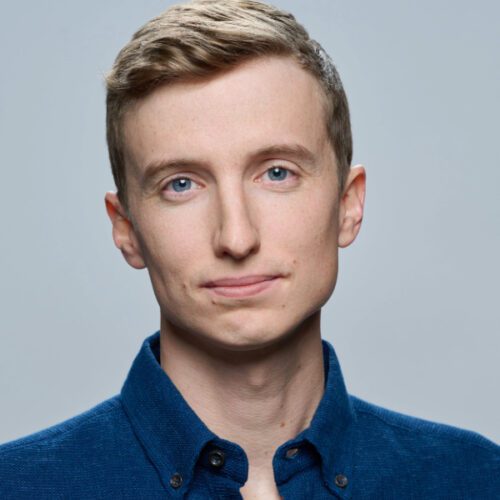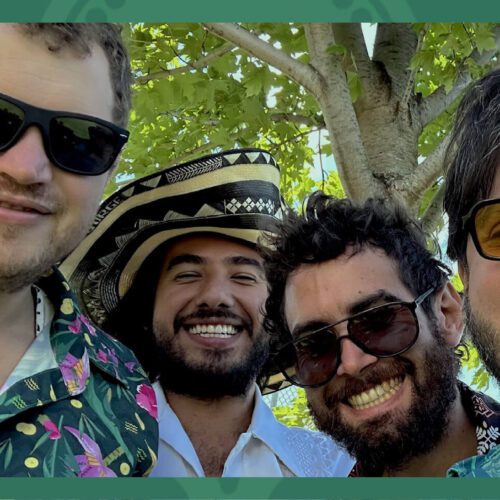Additional Information
Sitting somewhere, in a very special place between Nico and Pauline Oliveiros, she is highly respected in parallel music worlds such as her fellow citizen Merzbow or Keiji Haino. Phew, 65, also known as Hiromi Mortani, is a singer and avant-garde electronic composer based in Kanagawa – not far from Tokyo. Since she was frontwoman of Aunt Sally, one of Osaka’s earliest punk groups in the late 70’s, Phew became one of the main creative figures in Japanese avant-garde, exploring so many musical territories – ambient, darkwave, drone, élecroacoustic, techno, synthpunk, krautrock, industrial, noise, traditional Japanese music, to name a few. She’s been involved with important artists, from Riyuichi Sakamoto to Holger Czukay, Jaki Liebezeit or Einstürzende Neubauten. For a first time in Montreal she will be performing at FLUX festival, more precisely at Sala Rossa on Wednesday October 9th. Alain Brunet sent her some questions, here are her generous anwers written in Japan!
PAN M 360 : Hello, I am a music journalist and editor for www.pan.360.com. Those interview questions have been written regarding your live performance at FLUX festival in Montréal. I spent many hours listening to your music before writing those questions and I sincerely congratulate you for having designed a rich and diverse palette of sounds.
PHEW : Nice to meet you. Thanks for your interest in my music! This is my first time in Montreal and I am honored to play at Flux.
PAN M 360 : Your craft is so broad the we would like to know what would be soon its Montreal concert fragment? Can we have a few elements of this program?
PHEW : I have had some opportunities to play at club events and raves recently, so in Montreal, I think the set will emphasize rhythm. However, it is a far cry from what is called “dance music”.
PAN M 360 : What are your main exploration territories those days? Main projects in process? Can you please describe them?
PHEW : Recently, I have become increasingly disinterested in creating conceptual artwork and communicating messages through artwork. Since I believe that music is not a medium. Playing music as if I breathe is the ideal. When I return from the tour, I will start working on a piece for the FM art radio project. I haven’t decided on the content yet, but I have always been very interested in radio dramas, and I was obsessed with shortwave radios as a child, so I am very happy to have been asked to do this.
PAN M 360 : Can you tell us briefly about the way you compose and improvise on a daily basis?
PHEW : Almost every day I record a kind of sound sketch. My basic attitude in improvisation is to wait and listen. In the case of electronic sounds, I wait for the voltage to stabilize, and listen for minute fluctuations in the sound.
PAN M 360 : Do you mainly work and stay in Kanagawa? Why have you chosen this area , not far from Tokyo area? Better place for your lifetyle ?
PHEW : I have lived in Kawasaki City in Kanagawa Prefecture for more than 30 years now, and my feeling is no different from living in Tokyo. It is only about 6 km away from the border of Tokyo and 30 minutes to the center of Tokyo. It is a boring place, but I continue to live here because it is quiet and convenient.
PAN M 360 : About your international life : do you still travel a lot as a performing artist?
PHEW : although it was interrupted for two years due to a pandemic, since 2016, I have been touring abroad three to four times a year. I am very lucky.
PAN M 360 : Do you see yourself also as a citizen of the world?
PHEW : Depends on the definition of “world.” There are many worlds here that I don’t want to belong to. I love Kabuki, Japanese classical dance, and Japanese classical music, and I am probably influenced by them, but at the same time there are many worlds within Japan that I do not want to be in. What is most important to me is that I am an earthling and that every life has a responsibility to other lives.
PAN M 360 : Is Being punk artist in Osaka, at the early stage of your career, still has an impact on your way of assembling and treating sounds ? If yes, in what way? If no, how did it
disappear?
PHEW : Of course, it has influenced the way I construct my sound. Punk as a genre ended in 1978, but it is my opinion that punk is an attitude toward things. I am still a punk and will be a punk until I die.
PAN M 360 : After punk, there was your artistic encounter with the late Ryuichi Sakamoto, then a krautrock immersion with Holger Czukay and Jaki Liebezeit. What is left from this
period in your actual music? Can you tell us what were the high lights of this sequence of your life?
PHEW : I learned so much from the people I made music with during this period. In particular, my experience at Conny’s studio opened my ears and fundamentally changed the way I listen to music. I realized that music is architecture, and that by defining the sound image, it is possible to build it in three dimensions even with two speakers. This was a great discovery. If I had not met Conny Plank, I would not have continued with music.
PAN M 360 : You also worked with the American experimentalist John Duncan of Los AngelesFree Music Society fame using his customized shortwave radio set and Japanese musician Kondo Tatsuo on synthesizer and electronically treated piano. Was it an important period for you?
PHEW : When John Duncan first came to Japan, he contacted me and we agreed to play together; I knew nothing about LAFMS, and at the time I didn’t think our performance would be that interesting. Decades later I discovered the tape recording and thought it was a good performance. It took me a very long time to understand its importance.
PAN M 360 : Then an industrial chapter or something like that with Plank & Liebezeit, but this time featuring Einstürzende Neubauten, Alexander Hacke and D.A.F//Liaisons Dangereuses Christo Haas. What can we find in this music that remains today in your craft?
PHEW : As a singer, I enjoyed this recording very much. It was a very happy and luxurious experience to go to the studio without any preparation and have the songs created in the session on the spot. I discovered once again that by devising and processing the way to record raw sound, the sound has more presence than electronic sound.
PAN M 360 : Your palette of sounds is much broader then the previous descriptions of your career : academic electroacoustic, ambient, drone, noise, hardcore, shoegazing,
minimal, repetitive analog synths and more and more. Do you explore all those subgenres and sound ecosystems at the same time or through periods of time? Can you describe the process?
PHEW : I have never cared for the genre. However, no matter what style of music I play, the underlying principle is that voice : I am a singer. In other words, the most important thing for me is that music comes from the body, is an extension of the body, and should be so. This does not mean, however, that I emphasize live performance. It is my view that I am not a technology slave.
PAN M 360 : You can be considered as an experimental artist on every sides of it : electroacoustic research, pop/ rock avant-garde, ambient, etc. How do you situate yourself in this global music sounds ecosystem?
PHEW : I sit on a tiny, insignificant part of a vast ecosystem and of the universe. But I can be myself.
























